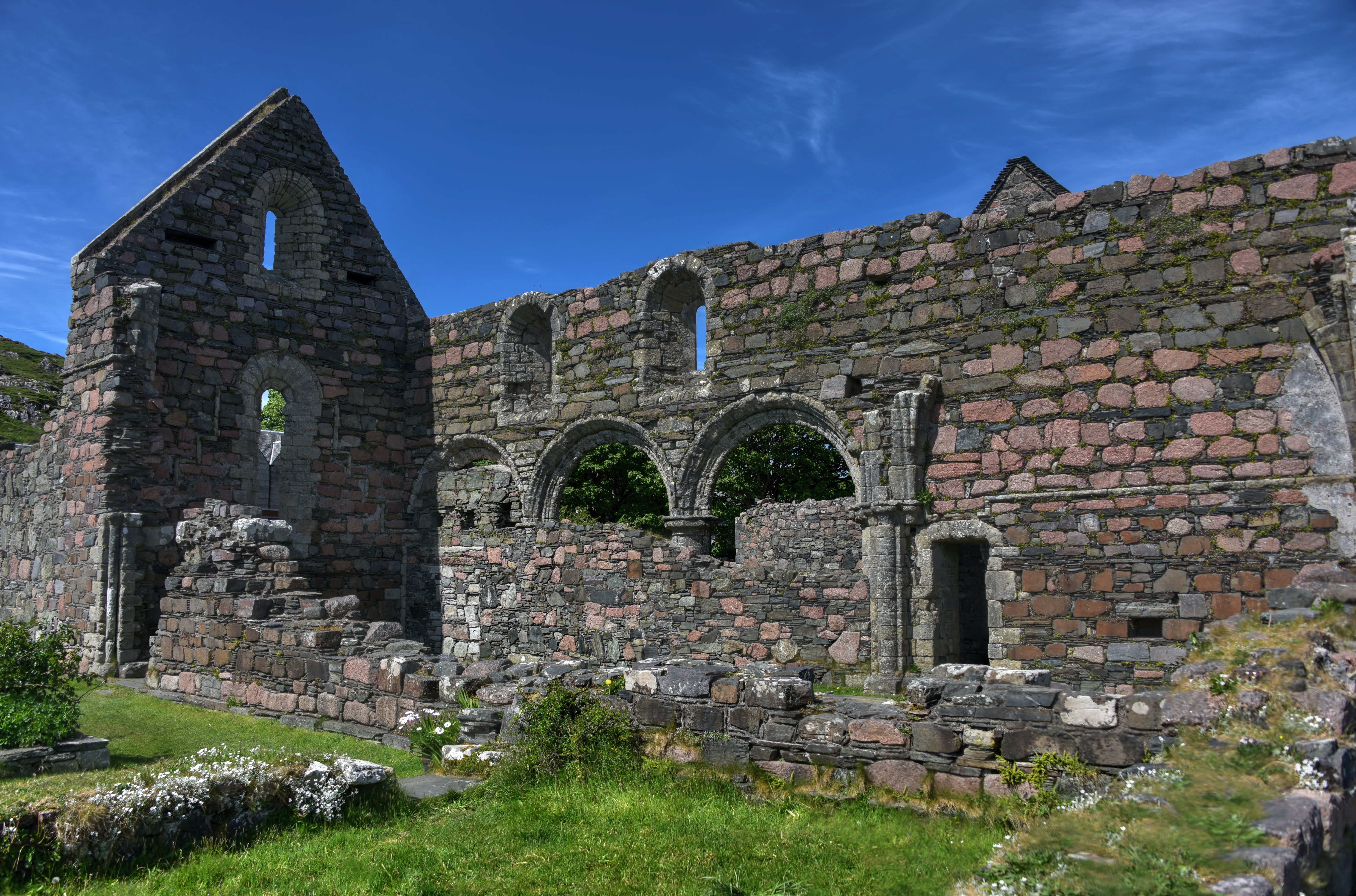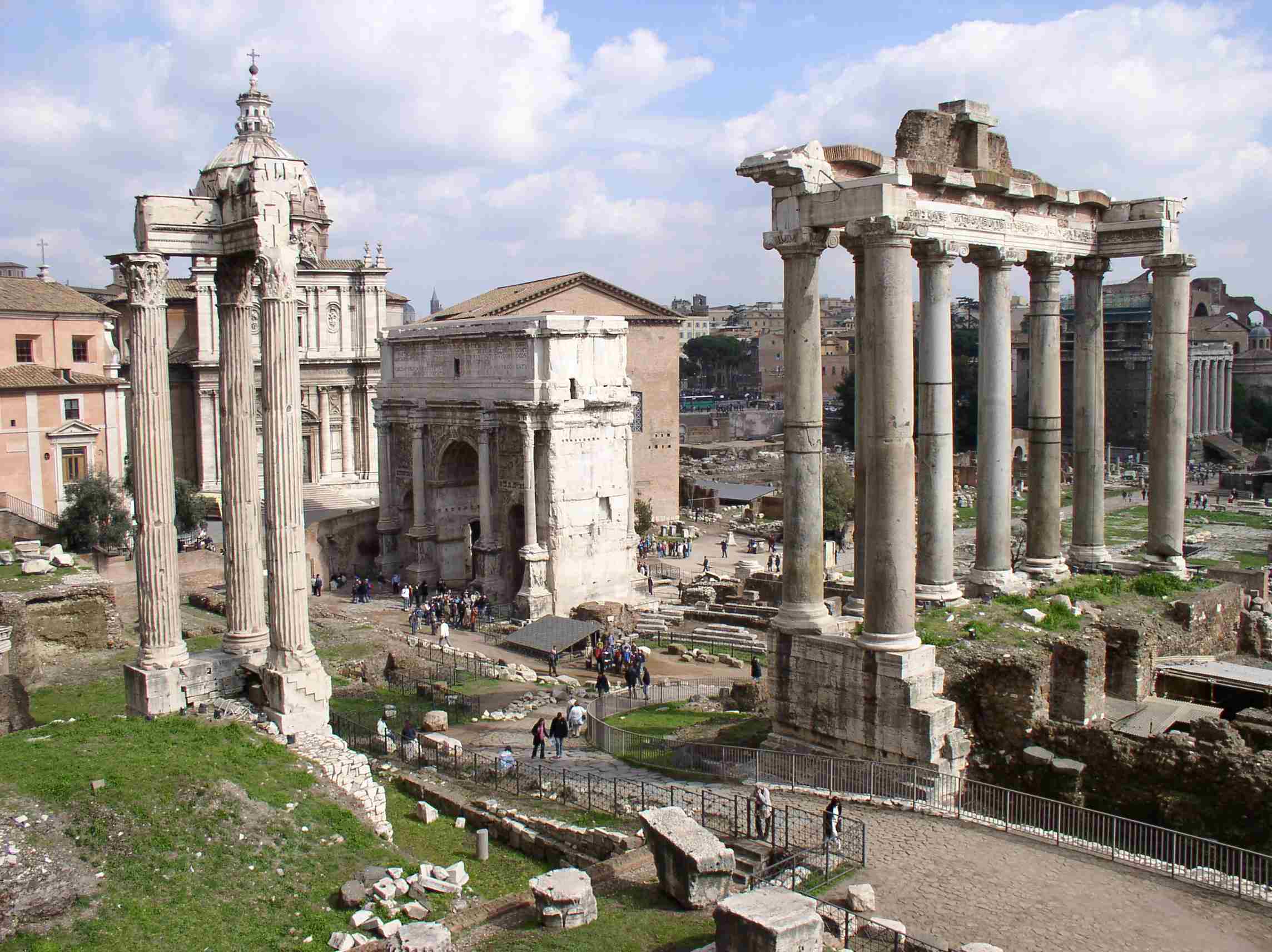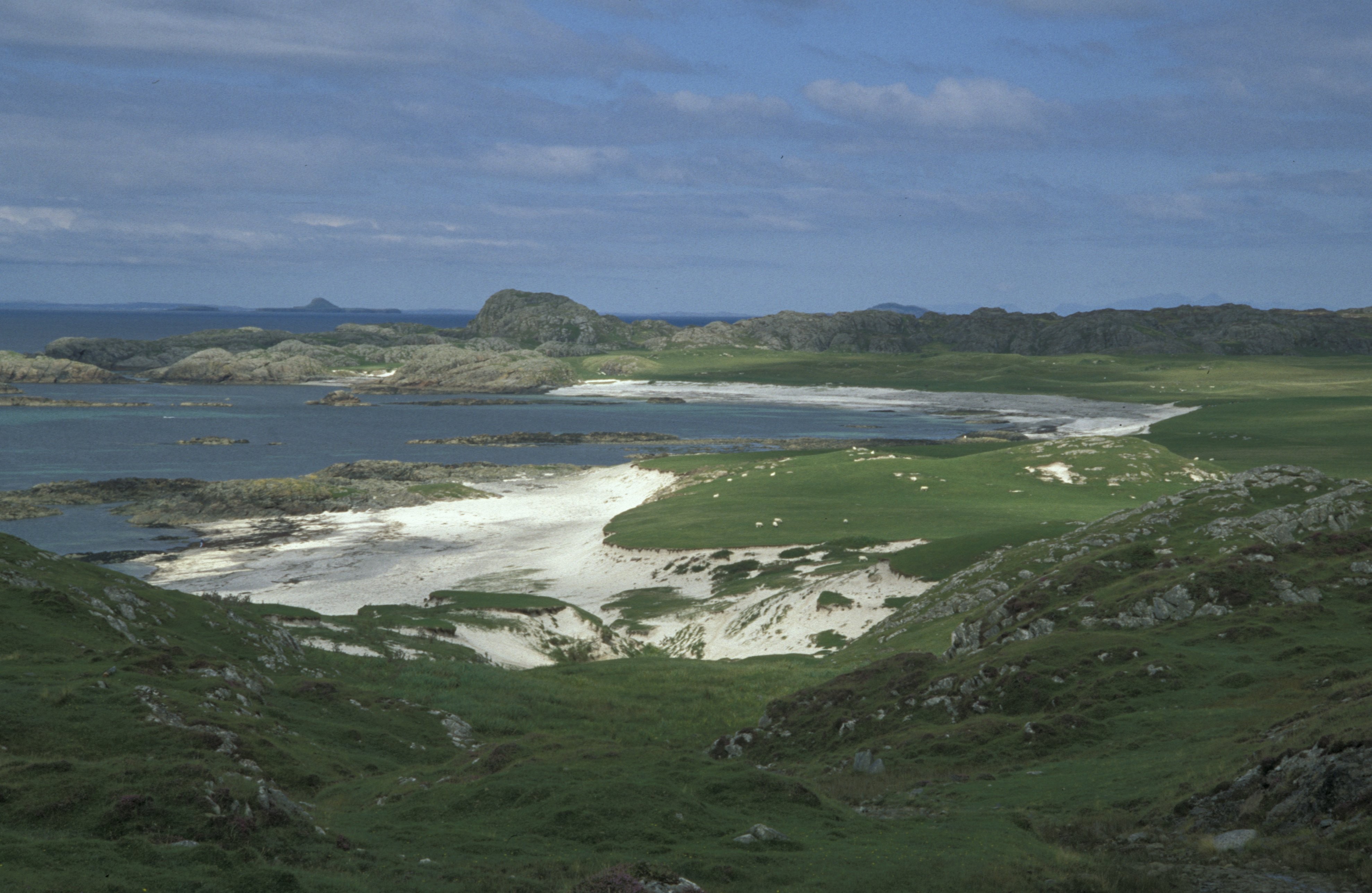|
Iona Nunnery
The Iona Nunnery was an Augustinian convent of nuns located on the island of Iona in the Inner Hebrides of Scotland. It was established sometime after the foundation of the nearby Benedictine monastery in 1203. Bethóc, daughter of Somerled, was first prioress. The ruins of the nunnery stand in a peaceful precinct adjacent to Iona's main (and only) village, Baile Mor. They form the most complete remains of a medieval nunnery extant in Scotland. After the Reformation, the priory was dissolved and reduced to a ruin. History The nunnery was founded after the establishment of the Benedictine monastery, which was likely founded by Raghnall mac Somhairle in 1203. Raghnall's sister, Bethóc, became the first prioress. This was one of the two Augustinian monasteries of women in Scotland, St. Leonards Nunnery located at Perth being the other. In the Abbey museum of the nearby Iona Abbey, the top half of a headstone of Anna MacLean, a prioress of the monastery of nuns who died in 1543, ... [...More Info...] [...Related Items...] OR: [Wikipedia] [Google] [Baidu] |
Ruins Of Iona Nunnery 2017-05-19
Ruins () are the remains of a civilization's architecture. The term refers to formerly intact structures that have fallen into a state of partial or total disrepair over time due to a variety of factors, such as lack of maintenance, deliberate destruction by humans, or uncontrollable destruction by natural phenomena. The most common root causes that yield ruins in their wake are natural disasters, armed conflict, and population decline, with many structures becoming progressively derelict over time due to long-term weathering and scavenging. There are famous ruins all over the world, with notable sites originating from ancient China, the Indus Valley and other regions of ancient India, ancient Iran, ancient Israel and Judea, ancient Iraq, ancient Greece, ancient Egypt, Roman sites throughout the Mediterranean Basin, and Incan and Mayan sites in the Americas. Ruins are of great importance to historians, archaeologists and anthropologists, whether they were once individual ... [...More Info...] [...Related Items...] OR: [Wikipedia] [Google] [Baidu] |
Iona Nunnery - Church Detail
Iona (; gd, Ì Chaluim Chille (IPA: �iːˈxaɫ̪ɯimˈçiʎə, sometimes simply ''Ì''; sco, Iona) is a small island in the Inner Hebrides, off the Ross of Mull on the western coast of Scotland. It is mainly known for Iona Abbey, though there are other buildings on the island. Iona Abbey was a centre of Gaelic monasticism for three centuries and is today known for its relative tranquility and natural environment. It is a tourist destination and a place for spiritual retreats. Its modern Scottish Gaelic name means "Iona of (Saint) Columba" (formerly anglicised as "Icolmkill"). In 2019, the island's estimated population was 120. Residents engage in farming, using traditional methods. Other occupations include crofting and tourism-related work; some craftsmen make goods for sale locally, such as pottery, tapestries, jewellery and knitted goods. In March 1980, the Hugh Fraser Foundation donated much of the main island (and its off-lying islands) to the current owner, the Nationa ... [...More Info...] [...Related Items...] OR: [Wikipedia] [Google] [Baidu] |
Historic Scotland Properties In Argyll And Bute
History (derived ) is the systematic study and the documentation of the human activity. The time period of event before the invention of writing systems is considered prehistory. "History" is an umbrella term comprising past events as well as the memory, discovery, collection, organization, presentation, and interpretation of these events. Historians seek knowledge of the past using historical sources such as written documents, oral accounts, art and material artifacts, and ecological markers. History is not complete and still has debatable mysteries. History is also an academic discipline which uses narrative to describe, examine, question, and analyze past events, and investigate their patterns of cause and effect. Historians often debate which narrative best explains an event, as well as the significance of different causes and effects. Historians also debate the nature of history as an end in itself, as well as its usefulness to give perspective on the problems of the p ... [...More Info...] [...Related Items...] OR: [Wikipedia] [Google] [Baidu] |
Augustinian Nunneries In Scotland
Augustinian may refer to: *Augustinians, members of religious orders following the Rule of St Augustine *Augustinianism, the teachings of Augustine of Hippo and his intellectual heirs *Someone who follows Augustine of Hippo *Canons Regular of Saint Augustine also called "Augustinian Canons" or "Austin Canons" * Order of Saint Augustine, a mendicant order, also called "Augustinian Friars" or "Austin Friars" See also *Augustine (other) Saint Augustine of Hippo (354–430), was a Church Father. Augustine may also refer to: People * Augustine (actor) (1955–2013), Malayalam film actor * Augustine of Canterbury (died 604), the first Archbishop of Canterbury * Saint Augustine (d ... * {{disambiguation Augustine of Hippo ... [...More Info...] [...Related Items...] OR: [Wikipedia] [Google] [Baidu] |
Christian Religious Orders Established In The 13th Century
Christians () are people who follow or adhere to Christianity, a monotheistic Abrahamic religion based on the life and teachings of Jesus Christ. The words ''Christ'' and ''Christian'' derive from the Koine Greek title ''Christós'' (Χριστός), a translation of the Biblical Hebrew term ''mashiach'' (מָשִׁיחַ) (usually rendered as ''messiah'' in English). While there are diverse interpretations of Christianity which sometimes conflict, they are united in believing that Jesus has a unique significance. The term ''Christian'' used as an adjective is descriptive of anything associated with Christianity or Christian churches, or in a proverbial sense "all that is noble, and good, and Christ-like." It does not have a meaning of 'of Christ' or 'related or pertaining to Christ'. According to a 2011 Pew Research Center survey, there were 2.2 billion Christians around the world in 2010, up from about 600 million in 1910. Today, about 37% of all Christians live in the Amer ... [...More Info...] [...Related Items...] OR: [Wikipedia] [Google] [Baidu] |
1203 Establishments In Scotland
1 (one, unit, unity) is a number representing a single or the only entity. 1 is also a numerical digit and represents a single unit of counting or measurement. For example, a line segment of ''unit length'' is a line segment of length 1. In conventions of sign where zero is considered neither positive nor negative, 1 is the first and smallest positive integer. It is also sometimes considered the first of the infinite sequence of natural numbers, followed by 2, although by other definitions 1 is the second natural number, following 0. The fundamental mathematical property of 1 is to be a multiplicative identity, meaning that any number multiplied by 1 equals the same number. Most if not all properties of 1 can be deduced from this. In advanced mathematics, a multiplicative identity is often denoted 1, even if it is not a number. 1 is by convention not considered a prime number; this was not universally accepted until the mid-20th century. Additionally, 1 is th ... [...More Info...] [...Related Items...] OR: [Wikipedia] [Google] [Baidu] |



.jpg)

